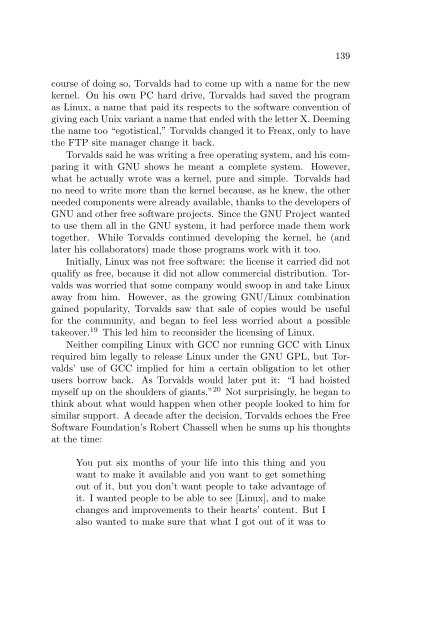You also want an ePaper? Increase the reach of your titles
YUMPU automatically turns print PDFs into web optimized ePapers that Google loves.
139<br />
course of doing so, Torvalds had to come up with a name for the new<br />
kernel. On his own PC hard drive, Torvalds had saved the program<br />
as Linux, a name that paid its respects to the software convention of<br />
giving each Unix variant a name that ended with the letter X. Deeming<br />
the name too “egotistical,” Torvalds changed it to Freax, only to have<br />
the FTP site manager change it back.<br />
Torvalds said he was writing a free operating system, and his comparing<br />
it with GNU shows he meant a complete system. However,<br />
what he actually wrote was a kernel, pure and simple. Torvalds had<br />
no need to write more than the kernel because, as he knew, the other<br />
needed components were already available, thanks to the developers of<br />
GNU and other free software projects. Since the GNU Project wanted<br />
to use them all in the GNU system, it had perforce made them work<br />
together. While Torvalds continued developing the kernel, he (and<br />
later his collaborators) made those programs work with it too.<br />
Initially, Linux was not free software: the license it carried did not<br />
qualify as free, because it did not allow commercial distribution. Torvalds<br />
was worried that some company would swoop in and take Linux<br />
away from him. However, as the growing GNU/Linux combination<br />
gained popularity, Torvalds saw that sale of copies would be useful<br />
for the community, and began to feel less worried about a possible<br />
takeover. 19 This led him to reconsider the licensing of Linux.<br />
Neither compiling Linux with GCC nor running GCC with Linux<br />
required him legally to release Linux under the GNU GPL, but Torvalds’<br />
use of GCC implied for him a certain obligation to let other<br />
users borrow back. As Torvalds would later put it: “I had hoisted<br />
myself up on the shoulders of giants.” 20 Not surprisingly, he began to<br />
think about what would happen when other people looked to him for<br />
similar support. A decade after the decision, Torvalds echoes the Free<br />
Software Foundation’s Robert Chassell when he sums up his thoughts<br />
at the time:<br />
You put six months of your life into this thing and you<br />
want to make it available and you want to get something<br />
out of it, but you don’t want people to take advantage of<br />
it. I wanted people to be able to see [Linux], and to make<br />
changes and improvements to their hearts’ content. But I<br />
also wanted to make sure that what I got out of it was to


